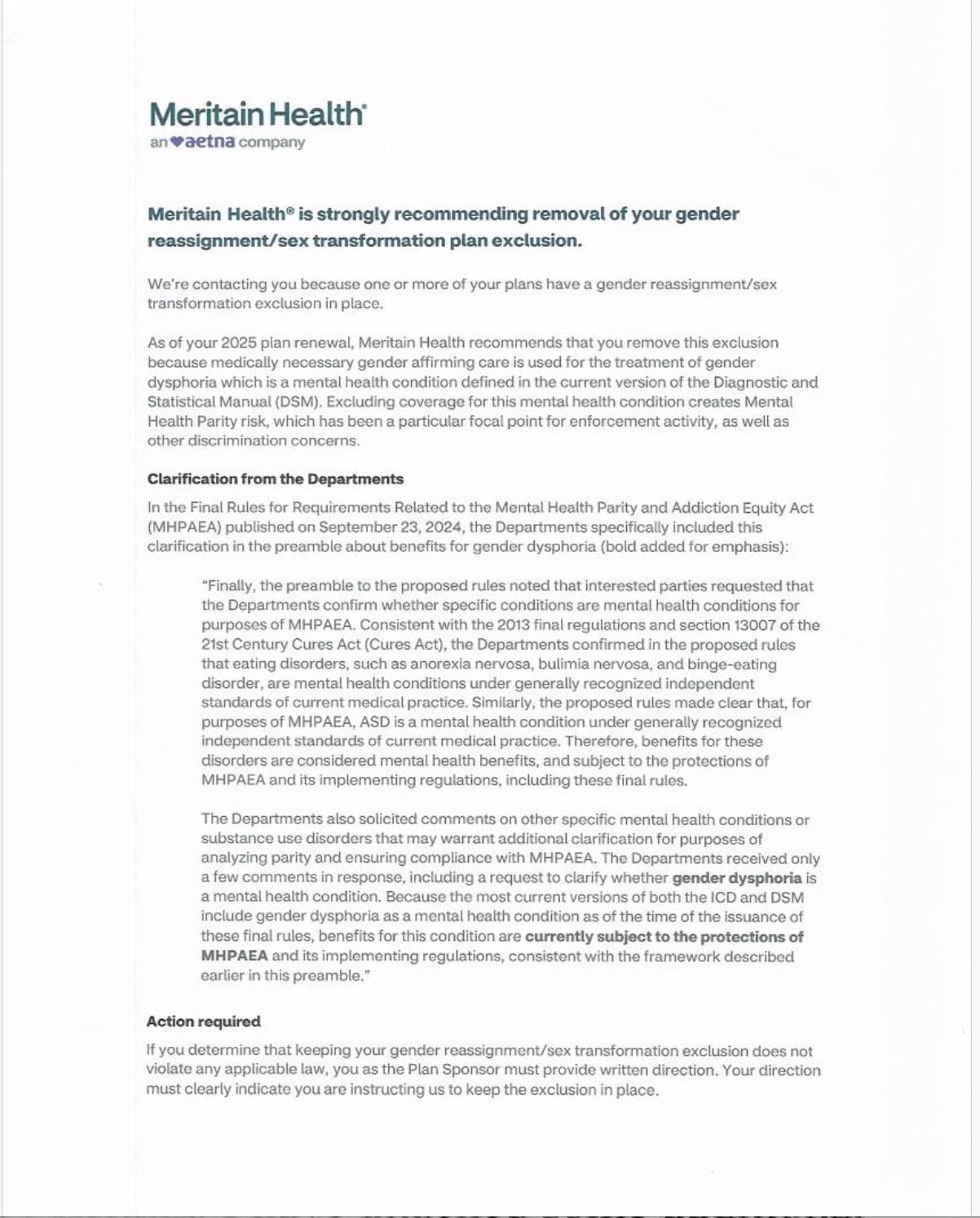MHPAEA
Wilson County School Board Faces Crossroads Over Sex Reassignment Coverage: A Crisis Created by Federal Overreach and Political Pressure
Wilson County Schools face mounting pressure to drop insurance exclusions for sex reassignment surgeries after Biden-era regulations. But federal strings tied to education funding raise deep concerns about sovereignty, choice, and taxpayer cost.

As Wilson County’s school board votes on health insurance plan amendments tonight, a deeper cultural and constitutional battle is unfolding—one that exposes how federal law and executive-level bureaucracies could be quietly forcing public institutions to subsidize gender reassignment procedures, often against the values of the communities they serve.
The issue at hand is the recommendation from insurance administrator Meritain Health to remove long-standing exclusions on sex reassignment and gender transformation procedures from Wilson County Schools’ employee health plan. This recommendation is being presented as a compliance necessity under two major federal statutes: the Mental Health Parity and Addiction Equity Act (MHPAEA) and Section 1557 of the Affordable Care Act (ACA).
But while the law is often framed as settled, the truth is more complex—and political. And Wilson County School Board members are now facing urgent pressure to decide whether to capitulate or take a stand.
The Regulatory Trap: How Federal Law Became a Weapon of Social Change
Both the ACA and MHPAEA were passed with partisan support. The ACA (2010) passed Congress without a single Republican vote in the House or Senate. The MHPAEA was originally signed into law in 2008 under President George W. Bush but was later expanded and aggressively reinterpreted under the Obama administration. These laws gave unelected bureaucrats and federal agencies the power to define enforcement guidelines—guidelines that have shifted dramatically depending on who holds the presidency.
Section 1557 was reinterpreted by the Biden administration to include gender identity under the definition of sex discrimination. In turn, this makes it legally risky for employers—public or private—to exclude coverage for gender reassignment, even if it is morally or medically controversial.
The urgency behind Meritain’s recommendation stems from regulatory changes finalized just before the 2024 election, under the Biden administration in September, on the proverbial eve of the November Presidential Election. These updates clarified that gender dysphoria is a protected mental health condition under MHPAEA, meaning any exclusions for gender-affirming care could trigger enforcement actions or lawsuits for violating parity.
As Meritain’s own letter states:
“Because the most current versions of both the ICD and DSM include gender dysphoria as a mental health condition... benefits for this condition are currently subject to the protections of MHPAEA and its implementing regulations.”
In plain English: exclude this treatment, and your plan may be targeted for non-compliance.

Not Medically Mandated: What the DSM-5 Actually Says About Treatment
Despite its inclusion in the DSM-5, gender dysphoria does not have a singular, medically-mandated treatment protocol. According to the American Psychiatric Association’s own framework, treatment options vary widely and are based on individual choice. These include:
- Psychotherapy
- Social transitioning (e.g., name/pronoun changes, clothing)
- Hormone therapy
- Gender reassignment surgery (in select cases)
There is no standard requirement that surgery be pursued, and the DSM-5 explicitly frames these options as dependent on the individual’s goals—not a medical imperative.
This stands in sharp contrast to other conditions like aggressive cancer, where patients are routinely denied coverage for life-saving treatments if insurers deem them experimental or low-probability. In those cases, insurers are applauded for cost control. But in the case of gender reassignment, denying coverage—despite it being elective and non-curative—invites accusations of discrimination and opens the door to litigation.
Presidential Power: What The Trump Administration Can Do NOW:
While neither MHPAEA nor Section 1557 can be repealed without Congress, a future Trump administration could immediately reverse much of this pressure through executive action.
Through an executive order, the President could:
- Direct the Department of Health and Human Services (HHS) to narrow the interpretation of “sex discrimination.”
- Scale back MHPAEA enforcement priorities to exclude elective gender reassignment from parity protections.
- Issue regulatory guidance protecting employers’ rights to maintain traditional exclusions for controversial procedures.
In short: enforcement of these mandates is not set in stone—it’s a choice, and it can be reversed.
Even with an executive order already issued to dismantle the U.S. Department of Education, federal funds are still flowing—and still being accepted by states and school districts. This is the crux of the issue. The dismantling of a federal bureaucracy is a necessary and symbolic first step, but until the money pipeline is cut off, the strings remain firmly attached. Whether funneled through what remains of the Department of Education or rerouted through other agencies like HHS, federal dollars come with conditions, and those conditions include ideological mandates—such as those embedded in Section 1557 of the Affordable Care Act and the Mental Health Parity and Addiction Equity Act (MHPAEA). These mandates now interpret gender reassignment as a protected treatment for a mental health condition, effectively forcing public institutions to fund controversial procedures with taxpayer dollars. Until states not only reject the federal bureaucracy but also the funding bait that enables it, the 10th Amendment arguments ring hollow. As long as we’re cashing the check, we’re signing the contract.
What the Wilson County School Board Can Do Right Now
Despite legal risks, the board is not helpless. They can:
1. Retain the exclusions and require Meritain to provide written acknowledgment that this choice was made knowingly.
2. Push back publicly on the basis of community values, medical uncertainty, and the elective nature of the treatment.
3. Request support from state legislators and members of Congress to challenge the federal overreach.
4. Demand a carveout for religious or conscientious objection under constitutional and Title VII protections.
Yes, these actions may invite lawsuits—but public officials take oaths to serve the people, not federal bureaucrats or politically motivated agencies. And the fiscal cost of submission may one day exceed the cost of defiance, both financially and morally.
Who to Contact: The Wilson County School Board
Voters and taxpayers are urged to respectfully contact board members and voice their concerns:
- Jamie Farough (Chairman) – Jamieforzone7@gmail.com | 615.420.8340
- Melissa Lynn (Vice Chair) – lynnzone3@gmail.com | 615.517.8684
- Greg Hohman – hohmagre100@wcschools.com | 615.922.0436
- Joseph Padilla – padiljos100@wcschools.com | 615.707.5261
- Dr. Beth Myers – meyereli100@wcschools.com | 225.963.1711
- Donnie Self – selfd@wcschools.com | 615.636.4662
- Kimberly McGee – kmcgee.zone6@gmail.com | 615.478.7828
Conclusion
Wilson County Schools—and school districts across America—are now the frontlines of a cultural and legal war that’s been quietly waged from Washington, D.C. What happens next is up to courageous local leaders willing to choose clarity over compliance.
This isn’t about discrimination. It’s about accountability. It’s about keeping taxpayer dollars from being weaponized to advance a controversial political agenda—one that was never debated in public, never voted on by school boards, and never authorized by the people.
Now is the time to draw a line.
If you support what I do, please consider donating a gift in order to sustain free, independent, and TRULY CONSERVATIVE media that is focused on Middle Tennessee and BEYOND!
Comments ()